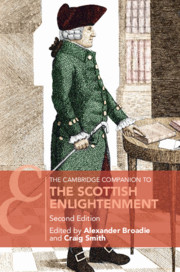Book contents
- The Cambridge Companion to the Scottish Enlightenment
- Series page
- The Cambridge Companion to the Scottish Enlightenment
- Copyright page
- Contents
- Contributors
- Acknowledgements
- Chronology of Events Relating to the Scottish Enlightenment
- Introduction
- 1 Several Contexts of the Scottish Enlightenment
- 2 Religion and Rational Theology
- 3 The Human Mind and Its Powers
- 4 Anthropology
- 5 Science in the Scottish Enlightenment
- 6 Scepticism and Common Sense
- 7 Moral Sense Theories and Other Sentimentalist Accounts of the Foundations of Morals
- 8 The Political Theory of the Scottish Enlightenment
- 9 Political Economy
- 10 Natural Jurisprudence and the Theory of Justice
- 11 Legal Theory in the Scottish Enlightenment
- 12 Sociality and Socialisation
- 13 Historiography
- 14 Art and Aesthetic Theory
- 15 Literature and Sentimentalism
- 16 The Impact on America
- 17 The Nineteenth-Century Aftermath
- Select Bibliography
- Index
- Series page
3 - The Human Mind and Its Powers
Published online by Cambridge University Press: 04 October 2019
- The Cambridge Companion to the Scottish Enlightenment
- Series page
- The Cambridge Companion to the Scottish Enlightenment
- Copyright page
- Contents
- Contributors
- Acknowledgements
- Chronology of Events Relating to the Scottish Enlightenment
- Introduction
- 1 Several Contexts of the Scottish Enlightenment
- 2 Religion and Rational Theology
- 3 The Human Mind and Its Powers
- 4 Anthropology
- 5 Science in the Scottish Enlightenment
- 6 Scepticism and Common Sense
- 7 Moral Sense Theories and Other Sentimentalist Accounts of the Foundations of Morals
- 8 The Political Theory of the Scottish Enlightenment
- 9 Political Economy
- 10 Natural Jurisprudence and the Theory of Justice
- 11 Legal Theory in the Scottish Enlightenment
- 12 Sociality and Socialisation
- 13 Historiography
- 14 Art and Aesthetic Theory
- 15 Literature and Sentimentalism
- 16 The Impact on America
- 17 The Nineteenth-Century Aftermath
- Select Bibliography
- Index
- Series page
Summary
This chapter examines the awareness of modern philosophy and its methods that Scottish thinkers brought to bear on the workings of the human mind. Both George Turnbull and Thomas Reid extend elements of Newton’s regulae, while they and others also deploy methods from Bacon, natural history, and the experimental philosophy more generally. Locke figures also as an important source of explanation for perception, and the Scots, principally Francis Hutcheson, extend this perceptual model to account for the sense of beauty and the moral sense. Both Turnbull and David Hume are notable for their constructive development of associationism, while Reid, emphasizing the objects of the mind s conscious awareness, introduces a new realism into Scottish philosophy.
- Type
- Chapter
- Information
- The Cambridge Companion to the Scottish Enlightenment , pp. 60 - 73Publisher: Cambridge University PressPrint publication year: 2019

